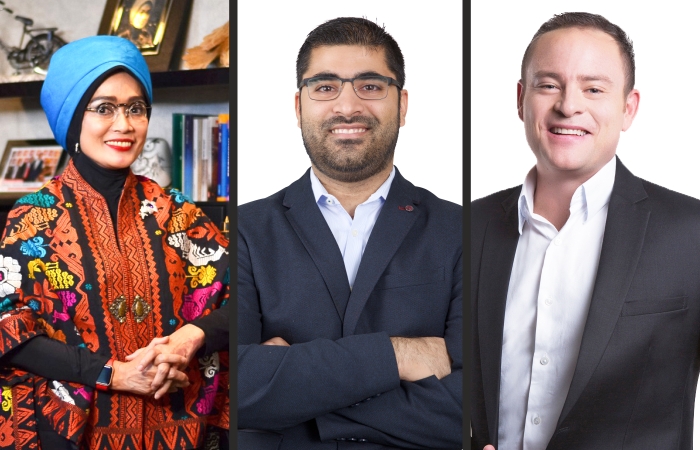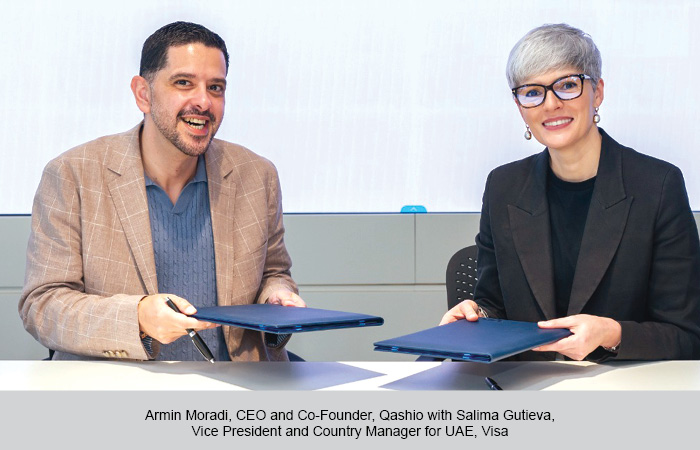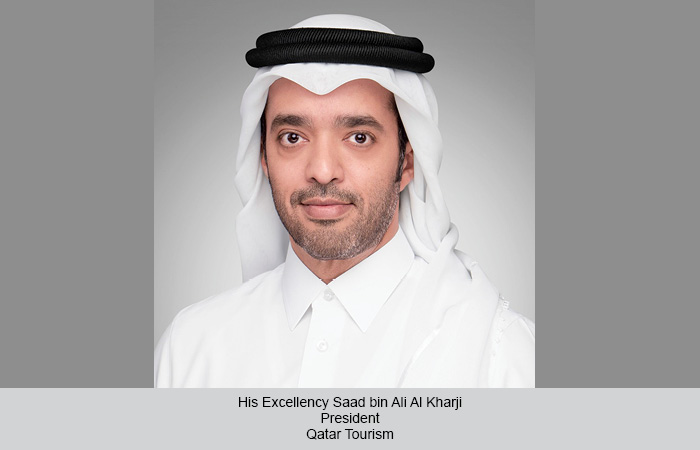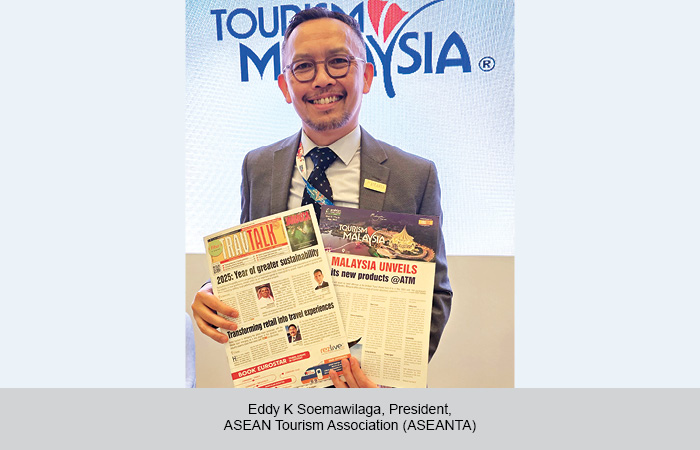The outbreak of the pandemic has seen the emergence of a new normal for the travel, tourism and hospitality industries. Three industry leaders discuss the strategies, outcomes, regulations and standards which need to be implemented.
Nia Niscaya, Deputy Minister for Marketing, Ministry of Tourism and Creative Economy, Republic of Indonesia
Middle East is a very important market for Indonesia as the length of stay and spends by a tourist from Middle East is above the average tourist coming to Indonesia. About 60 per cent of the Middle East arrivals are from Saudi Arabia. Also, Dubai is the hub of tourists coming to Indonesia from all over the world. As of now, we are facing a situation where the government is trying to cope with the COVID pandemic. Today it seems like Jakarta has been hit the hardest but now the numbers are going down. Bali however, being the capital of Indonesia is not so bad as the number of people affected and death rate is really low. Bali is a role model for other areas.
Rise of domestic tourism
Our marketing strategy at this point of time is focused on domestic first, the emphasis is on amplifying the government’s message ‘stay at home’. For international tourists we manage our presence or reconnect with the market with Visit Indonesia using marketing representatives; we have been discussing through the technology in the market through webinars to amplify what we are doing with the government in coping with COVID to regain the confidence of the travellers. Basically, we are doing what we call CHS implementation in health and safety protocol in all touchpoints of the destination and attractions. We will have a continuous programme with all players – online travel agents, airlines and sellers, and media to make sure this is a destination that is ready. Since the destination Indonesia is so huge we have to prioritise, the minister has already decided, first is Bali and second is a domestic tourist destination and Batang Bintang is for those coming from Singapore. First the President is looking at safety of the people, domestic tourism will rebound first. As a government we have to go back to work, so we have to live with COVID. Currently we are very rigid when it comes to protocols for everyone.
Strategising new plans
We have to change our marketing plans and the minister wants us to spend more on the budget for digital and social media so that there is more engagement with local players as they are the ones who need to know. We must also empower our marketing team members since they are our eyes and ears. Since budget is limited, we need to balance the customer, hence we keep inspiring the market. As Middle East is a wide market and one of our important source markets, we believe that both expats and locals from the Middle East will start travelling very soon. We are going to tap all markets with new strategies to ensure that we regain the confidence of the travellers. The Kingdom of Saudi Arabia and United Arab Emirates are different markets. Our main source markets are from these two countries and we believe that travellers will return very soon as we open the borders.
Medical requirements and safety
Currently we are working on ensuring the medical requirements for domestic visitors as phase one, the next phase will be regional and thereafter international for every traveller. We need to ensure their safety in terms of hygiene and a cleaner environment. As Indonesia is a vast destination with over 14,000 islands we are able to manage the curve. Window bookings will become shorter and then the demand will be lower but the supply will be higher so competition will be very hard. I would like to welcome travellers to a cleaner, safer and healthier Indonesia.
Muzzammil Ahussain, EVP – Consumer Travel, Seera Group
In the market the bookings have been remodeled and what we have done is – on a multi-platform we have decided to identify where we need to make investments in our technology platform. We have been growing fast and our customers are our partners. At this juncture we are focusing on cleaning up and working on amendments and cancellations. First, we are doing our best to prepare for the new normal; with our technology we provide our customers information, so we want to provide good information & good content, thus making our customers more involved. Second, we are understanding the customer needs, especially of our customers in Saudi Arabia, Kuwait and UAE – the first market will be the domestic market that will pick up, so we our understanding their requirements, what kind of information they want to know, and destinations they want to know about as travel patterns are different. For example, one of the things we found out is that medical safety certificate is a requirement. So, before they travel to the destinations, unless they know about them as a travel agent, both online and offline we need to convey this information. Third, we have over 250 travel guides in Saudi Arabia and we will educate them about travel safety within the destinations.
Tourism on the rebound
I think it will be life with COVID and airlines, travel agents, the entire tourism industry will survive, it may take 18 to 24 months without any other challenges. The best possible way is to connect with the new normal as soon as possible. What we are looking at is both qualitative and quantitative methods; in the quantitative method we deal with questions such as what are the issues with the destination they need to know about, all standard information but in terms of experience it will be different. For example, if someone is coming on vacation to Dubai and if the malls, beaches and parks are closed then we will not advise them to come over, we will look for another destination, obviously the challenge would be you may come today and in a week things will change, so we need to provide the relevant information to our clients to help them understand what experiences they can enjoy in the destinations that they will select. Second is the journey, the amount of time spent to determine the safety records, if we provide
information for pre-visit, time of visit and post-visit, it will be really helpful to our customers.
Health and safety guidelines
During pre-COVID we used to work with hotels, tourism boards, where we brought our experts to understand the destination. We are not health and safety experts so what we do is obtain the relevant information and educate our clients, this is how we provide them with inputs on safety and regulations.
Repatriation travel and domestic tourism
UAE is an 80 per cent expat market and 10 per cent Emirati market; the first phase of travel we are currently seeing is the expats leaving back for home. Staycations will be the way forward for both expats and locals. Saudi government announced the return of the domestic flights so this means that there will be a rise in domestic tourism. They are ready to travel now during summer – but passage should be open for them to come back, so hopefully once other countries open their borders there will be international travel as well, but it will take some time.
Keeping the faith
One of the most important aspects is keeping our clients happy and informed, and engaging with them to ensure that they know what is taking place as many travellers are keen to travel again. We keep updating the market, so we need to be creative with the tourism board. We need to work with tourism boards and all stakeholders. It will be easier for a traveller if there are more rules, there will be a few hiccups on the way, but coordination can be done easily, so we need to understand what a traveller wants. We know that people in the Middle East want to travel and every year they travel at least a few times during the year to outbound locations. It may take some time, but we can see that travel will pick up gradually in small groups at first. In terms of hotels, the hygiene and safety standards will be much better than before, and it will be a new experience for the customers.
Paul Wilson, Executive Vice President – Commercial, Cross Hotels and Resorts
We need to learn to live with the coronavirus and the world must go on. We are seeing a lot of easing in laws so we started to see our occupancies grow. In the past few weeks in our three properties in and around Bangkok, we have seen occupancy going up to 90 and 100 per cent in mid-week, so this shows the changes in how people travel. For instance, people don’t have to work from office anymore, we see that on Sunday and Monday people are staying and working at the hotel, so these are the opportunities we need to focus on. We have also seen our tier-2 and tier-3 cities growing so we have seen a lot of growth in boutique areas as well. The Middle East has been resilient as it closed down only 36 per cent of the hotels as compared to other countries that closed down 70-80 per cent of their hotels.
When we look at occupancy, especially Saudi, the rate from 39 per cent went up to 49 per cent, so again we are seeing a lot of positive traits coming into the market from the region. For us, it is very straight forward why this market is so important to us. They spend when they come to the hotel and to be honest, they are the second highest spenders after the French. Their length of stay is more, we are just six hours away, Bangkok is the most visited city in the world, we see people coming for two to three days and even two to three weeks. Middle East travellers come with their families, which is good in terms of their spends in the destination and the properties.
Travelling in the new norm
We have to live with the coronavirus and eventually it will become the norm. So I would not say that the hotels will change. People don’t want to get sick so there will be a difference. We have analysts checking facts day in and day out, now its domestic then it will be regional, lastly you will target international travellers. We have to focus on new destinations, people want to move away from crowded areas.
Medical certification
The current situation is so dynamic, we have been educated on how to fight the virus. There was a time in Zambia when you had to get so many vaccinations just to travel there, yet it didn’t stop people from travelling. So, it all depends on individual preferences, if you want to travel then you will do so.
Asia to regain its lustre
People want to and need to travel; it is in their DNA. Asia has proven to be resilient and it is more affordable for travellers, so I believe that Asia will bounce back very fast. In terms of booking patterns, it will be a lot shorter and in terms of hotels we need to provide a better experience. It should be more efficient and food will have to be served in healthier environments with more safety standards, the cooking itself might need to be a notch higher as people will look for a more healthier experience. They will also be more alert about the standards so that they can have a trouble free experience.
Input by Shehara Rizly
 TravTalk Middle East Online Magazine
TravTalk Middle East Online Magazine






